|
|
|
Sort Order |
|
|
|
Items / Page
|
|
|
|
|
|
|
| Srl | Item |
| 1 |
ID:
075500
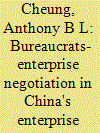

|
|
|
|
|
| Publication |
2005.
|
| Summary/Abstract |
This article explores the implementation of SOE reform in China at the local level, using case studies in Guangzhou as illustration. It is argued that local government spearheads a reform agenda that puts locally-defined state objectives first, not necessarily favouring enterprise restructuring. A full-fledged negotiation model does not exist in SOE reforms because all enterprises are controlled by the state and have to comply with top-down policies and orders. Government-enterprise relations and the degree of entrepreneurial power depend largely on the economic strength of the enterprise, with the boomers getting a good economic bargain while the laggards fail to gain sympathy from government. Enterprise workers are largely at the mercy of restructuring decisions that come from bargaining and at times collusion between managers and local bureaucrats.
|
|
|
|
|
|
|
|
|
|
|
|
|
|
|
|
| 2 |
ID:
166335
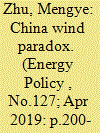

|
|
|
|
|
| Summary/Abstract |
China has seen a surge in wind power installation over the past decade, and is now the world leader in installed capacity. However, wind curtailment – i.e., when the power grid frequently interrupts the power connection of installed wind capacity – has become an increasingly serious problem. But despite wind curtailment significantly jeopardizing wind power developers’ profitability in China, companies have continued to invest. This study, based on extensive interviews with decision-makers in China's Central State-Owned Enterprises (CSOEs), attempts to explain this seeming paradox. Since the majority of wind power investment in China has been made by CSOEs, previous findings of SOE studies assume that this continued investment abjures “economic rationality” due to political/policy burdens. However, this study shows that this is not necessarily accurate. CSOEs’ investment behavior also accords with market logic, as they competed fiercely over wind power sites, increasing investment scale as a rational long-term strategy of profitability. We also find that the embrace of market logic by CSOEs has resulted from recent economic and power sector reforms. For a more efficient market, policy-makers must pay greater attention to the quality of competition among CSOEs.
|
|
|
|
|
|
|
|
|
|
|
|
|
|
|
|
| 3 |
ID:
183780
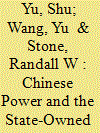

|
|
|
|
|
| Summary/Abstract |
China has become a leading source of outward foreign direct investment (FDI), and the Chinese state exercises a unique degree of influence over its firms. We explore the patterns of political influence over FDI using a comprehensive firm-level data set on Chinese outward FDI from 2000 to 2013. Using six country-level measures of affinity for China, we find that state-owned and globally diversified firms appear to conform most closely to official guidance. Official investment directives and state visits link investments to state policies; Taiwan recognition and Dalai Lama meetings anchor our political interpretations; and UN General Assembly voting and temporary UN Security Council membership suggest that this intervention may be systematic. The results are robust to country, year, and sector fixed effects, and most do not hold for private or small firms. The results suggest that China uses FDI by prominent state-owned enterprises as an instrument to promote its foreign policy.
|
|
|
|
|
|
|
|
|
|
|
|
|
|
|
|
| 4 |
ID:
181932


|
|
|
|
|
| Summary/Abstract |
To what extent has governance of China's state-owned economy changed under Xi Jinping? Against the background of momentous shifts in the political arena since 2012, some observe a decisive departure in Xi's approach to managing state-owned enterprises (SOEs): towards tight centralized control by the Chinese Communist Party and away from gradual marketization. Analysing the main aims and methods of SOE governance over the last two decades, we find that SOE policy under Xi exhibits a deepening of pre-existing trends rather than a departure. First, the essential vision of SOE functions articulated under Xi is strikingly consistent with that of his predecessors. Second, his administration's approach to governing SOEs is not novel; it relies on established mechanisms of bureaucratic design, the cadre management system, Party organizations and campaigns. While Xi has amplified Party-centred tools of command and control, this appears to be an incremental rather than a radical shift in approach.
|
|
|
|
|
|
|
|
|
|
|
|
|
|
|
|
| 5 |
ID:
071986
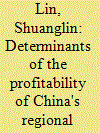

|
|
|
|
|
| Publication |
2006.
|
| Summary/Abstract |
This paper examines the determinants of the profitability of China's local state enterprises. The investment share of non-state enterprises is found to be positively related to the profitability of regional SOEs. Openness measured by exports share in GDP is positively related to regional SOEs' profitability in all cross-sectional and most panel regressions. Debt ratio is negatively related to SOEs' profitability in most cross-sectional and panel regressions. The ratio of unhealthy assets to total assets is negatively related to the profitability in all cross-sectional regressions and is negatively but insignificantly related to the profitability in most panel regressions.
|
|
|
|
|
|
|
|
|
|
|
|
|
|
|
|
| 6 |
ID:
156967


|
|
|
|
|
| Summary/Abstract |
Private investment in Malaysia has been sluggish since the Asian Financial Crisis. One explanation is that the growing presence of state-owned enterprises (SOEs) or government-linked corporations (GLCs) has been crowding out private investment. For the first time, we provide empirical evidence on the relationship between GLC presence and private investment, employing a unique database covering 443 firms between 2007 and 2011. We find that when GLCs are dominant in an industry, investment by private firms is significantly negatively affected. Conversely, when GLCs do not dominate an industry, the impact on private investment is not seen. Sensitivity tests associated with varying the level of the threshold used to determine dominance confirm the robustness of the results. To revive private investment in Malaysia, the government must not only redress its growing fiscal deficit, but also expedite its programme of divestment.
|
|
|
|
|
|
|
|
|
|
|
|
|
|
|
|
| 7 |
ID:
181393


|
|
|
|
|
| Summary/Abstract |
There has been a debate on how the state-driven anticorruption movement during the Xi Jinping administration has influenced state-owned enterprises (SOEs). Research has examined the relationship between corruption and economic development at the country level in Asia and has found paradoxically that economic growth and high corruption levels can coexist. However, the “Asian paradox” that appears at the country level may be a transitional phenomenon of the short term. Not many researchers have empirically compared individual firm-level performance before and after a strong anticorruption drive, drawing on relevant comparison groups. This study tests whether Xi’s 2012 anticorruption campaign improved SOEs’ performance. With a difference-in-differences method, it explores whether the anticorruption campaign had different effects on the financial performance of SOEs and non-SOEs (private companies). We find that the anticorruption initiative improved SOEs’ financial performance and benefited SOEs more than non-SOEs.
|
|
|
|
|
|
|
|
|
|
|
|
|
|
|
|
| 8 |
ID:
168303


|
|
|
|
|
| Summary/Abstract |
As electricity consumption in Vietnam has continued to increase much faster than has GDP, electricity intensity (EI) in the country has risen to levels far exceeding those of other Asia-Pacific economies (APEs). By analyzing evidence from a comparative study of other APEs through using the World Bank data, this study proves that EI in Vietnam is excessive and that its escalation over the last few decades cannot be justified as being due to supporting the country's policy of high economic growth. Factor analysis of the economic and electricity indicators for 22 APEs was used to track the shortcomings of the economic structure leading to the EI escalation in Vietnam. Electricity tariff, service share of GDP, and level of institution were identified as determinants of EI across the region. Given the weak performance regarding these indicators, Vietnam has highest EI among APEs followed by China and Mongolia. To reduce EI, Vietnam should consider diversifying away from the electricity-intensive industry sector toward economic activities such as service and information technology. The economic reform should be accelerated to complete the competitive electricity market and reduce the inefficiency of electricity usage through poorly managed state-owned enterprises and inefficient public investment projects.
|
|
|
|
|
|
|
|
|
|
|
|
|
|
|
|
| 9 |
ID:
162085


|
|
|
|
|
| Summary/Abstract |
How has the Xi Jinping administration recentralised authority over China’s politics and economy? Studies of Xi’s rule often suggest that his “core leader” status, revolutionary heritage, and informal network of loyalists underpin this consolidation of central control. In contrast, this article focuses on the state sector to highlight how the Xi administration’s recentralisation of authority is grounded in existing governance mechanisms and techniques: central leading small groups, the cadre management system, Party committees, and campaigns. Using policy documents and an original dataset on central state-owned enterprise leaders, I provide evidence that the Xi administration has leveraged each of these four methods to reclaim central authority relative to the preceding Hu Jintao administration. These findings contribute to scholarship on adaptive authoritarian governance and economic reform in China by underscoring that administrations can use existing instruments of central control in divergent ways.
|
|
|
|
|
|
|
|
|
|
|
|
|
|
|
|
| 10 |
ID:
151437


|
|
|
|
|
| Summary/Abstract |
Since the coming to power of Kim Jong Un in 2012, the North Korean government has recently announced, and to some degree has implemented, a new set of economic management policies known as the June 28th measures in 2012 and the May 30th measures in 2014. Both of these sets of measures seek to build upon the abandoned reforms of the early 2000s through restructuring North Korea's highly inefficient collective farm and state-owned enterprise management system. In addition, the government has intensified ongoing efforts at building special economic zones for the purpose of attracting foreign investment. As such, the country is attempting to emulate the reforms adopted by China in the late 1970s. Although the success of these efforts is by no means guaranteed, they do serve to question mainstream analyses that suggest that Juche Self-Reliance or Sŏn'gun Military First Politics ideologies will inhibit any genuine attempt at economic reform in North Korea. We argue, in contrast, that ongoing changes to North Korean state and society mean that, a cyclical stop and start rhythm to the reforms notwithstanding, such attempts at economic reform are likely to continue. However, we also argue that while the contemporary reform drive resembles and may indeed reproduce some of the successes of the Chinese experience, North Korea faces significantly greater challenges, including the greater decline of North Korean industry, local resistance to reform, and the dangers of inflation. Furthermore, North Korea faces a highly challenging external security environment that undermines the ability of the regime to attract investment and by extension the political standing of reformist elements within the country. Given this contrast with the international environment surrounding China's own reform experience, our analysis emphasises the importance of geopolitical context in shaping experiences of economic reform and of development more broadly.
|
|
|
|
|
|
|
|
|
|
|
|
|
|
|
|
| 11 |
ID:
124893
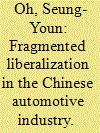

|
|
|
|
|
| Publication |
2013.
|
| Summary/Abstract |
This paper explains the extraordinary rise of the Beijing Hyundai Motor Company (BHMC), a joint venture between a state-owned enterprise run by the Beijing municipal government and Hyundai Motor Company. Within the span of three years, the BHMC soared to become China's second-ranked automotive manufacturer in terms of units sold. I highlight the role of the Beijing municipal government in creating favourable market conditions for the BHMC during its initial operation phase (2002-2005). The Beijing municipal government selectively adopted protectionist measures and liberalizing measures to promote its locally based company. I characterize this practice as fragmented liberalization, a system through which sub-national governments discriminately apply WTO or central government regulations to promote their local joint venture partner. In so doing, I also challenge the existing assumption that multinational companies are the drivers of economic liberalization, by showing Hyundai's support for local protectionism and industrial policy at the sub-national level.
|
|
|
|
|
|
|
|
|
|
|
|
|
|
|
|
| 12 |
ID:
170088
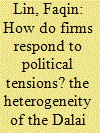

|
|
|
|
|
| Summary/Abstract |
Little is known about the firm-level dynamics behind trade responses to political tensions. This article reinvestigates variation in the travel pattern of the 14th Dalai Lama to study how political tensions affect trading decisions of Chinese importers. Using monthly trade data from China Customs covering imports of machinery and transport equipment from 173 countries over the 2000–2006 period, our empirical results show a significant reduction of imports in response to foreign government members' meetings with the Dalai Lama. In line with the idea that Chinese importers face a trade-off between bearing costs from suboptimal trade transactions and costs from not accommodating the government, this ‘Dalai Lama Effect’ operates at the intensive margin, i.e., via a decrease in the import volume per importer. Examining differential effects across types of firm ownership, we find that the observed effect is driven by state-owned enterprises (and foreign-invested firms) and not by private companies. Moreover, while direct importers temporarily reduce their trade with Dalai Lama-receiving countries, there is some evidence that trade intermediaries fill the void. Overall, we find the effects to be much more short-lived than previously thought.
|
|
|
|
|
|
|
|
|
|
|
|
|
|
|
|
| 13 |
ID:
174071


|
|
|
|
|
| Summary/Abstract |
Chinese state-owned enterprises (SOEs) have become an important source of foreign direct investment (FDI) in resource-rich countries. Their expansion has stirred a debate in the Western hemisphere about the ability of SOEs to challenge liberal economic practices and to alter domestic governance in the countries where they invest. This paper contributes to this debate by examining the case of Chinese SOE investment in the Canadian hydrocarbon sector. It uses insights from the literature on the world order, international business, and international relations to examine the impact of SOE investment on a host country in the Western hemisphere. As I argue, the Canadian response to SOE’s investment has been on the cautionary side, which opens avenues for institutional innovation that leads to stricter regulations of SOEs’ FDI. As I propose, stricter regulations can be reinterpreted as an attempt to support liberal economic practices, yet may unintentionally have the opposite effect.
|
|
|
|
|
|
|
|
|
|
|
|
|
|
|
|
| 14 |
ID:
075354


|
|
|
| 15 |
ID:
129806


|
|
|
|
|
| Publication |
2014.
|
| Summary/Abstract |
Before the 21st century, Chinese presence in Libya was minimal. In the last years of the Gaddafi regime, however, a large-scale temporary migrant community quickly formed. Then, as unrest in Libya increased, the community was withdrawn abruptly in early 2011 in China's first officially organized mass evacuation. This short-lived community does not display the characteristics associated with Chinese migration to Africa as a whole, suggesting the necessity of local ethnographic case studies across the continent to form a more accurate and complete picture. Migration was spurred by labour contracted by state-owned enterprises (SOEs) from all over China, and did not feature private traders except for those who provided services for the labourers. It is probable that any recurrence of Chinese migration into Libya will again be SOE-driven, although favourable attitudes and policies on the part of the post-Gaddafi administration could possibly engender a more autonomous minority.
|
|
|
|
|
|
|
|
|
|
|
|
|
|
|
|
| 16 |
ID:
160427
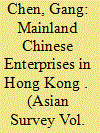

|
|
|
|
|
| Summary/Abstract |
This paper examines the under-researched subject of the political and economic functions of Mainland Chinese enterprises in Hong Kong. The lack of effective cross-border supervision of these offshore state assets has exacerbated the longstanding principal–agent problem, resulting in spillover effects such as high property prices and worsening corporate corruption.
|
|
|
|
|
|
|
|
|
|
|
|
|
|
|
|
| 17 |
ID:
092873


|
|
|
|
|
| Publication |
2009.
|
| Summary/Abstract |
Management corruption, defined as the drain on state assets caused by corruption of public managers, is rampant in China. This study analyzes the rise of management corruption by examining the changing forms and characteristics of corruption in the context of China's industrial restructuring. It pays special attention to the typical asset-stripping strategies and tactics under certain institutional settings. By focusing on the new incentives and opportunities for management corruption and their linkage with the ownership restructuring scheme in the state economy, the article aims to reach a better understanding of not only management corruption per se but also the ways in which the Chinese state has responded, or failed to respond, to the problems and challenges that have accompanied its reform efforts. The findings of this study reveal the forces at work behind the massive drain on the state assets and point to the tension facing the Chinese state between the need for transforming the state economy and its capacity for monitoring and regulating the restructuring process. Corruption is a matter concerning not just the misconduct of public managers, but also institutional reconfiguration, policy framework, and the government's regulation of state enterprises.
|
|
|
|
|
|
|
|
|
|
|
|
|
|
|
|
| 18 |
ID:
161863


|
|
|
|
|
| Summary/Abstract |
We derive the conditions under which a manager will divert and how managerial diversion affects product market performance and firm profits. Our model predicts that managerial diversion is more likely to occur and leads to more aggressive product market behavior in a firm with weak incentives and corporate governance. In these firms, the relation between managerial diversion and firm profits is inverse U-shaped. Chinese state-owned manufacturing firms are used to test our theoretical model, and we find supportive evidence.
|
|
|
|
|
|
|
|
|
|
|
|
|
|
|
|
| 19 |
ID:
172270


|
|
|
|
|
| Summary/Abstract |
The SOE (state-owned enterprise) sector provides an important avenue to political power in China. A number of SOE executives are members of the Central Committee of the Communist Party of China (CPC) and often they change career tracks to become leading government and Party officials. In the past, the oil and gas sector was a significant recruitment basis for government and Party leaders. However, in recent years, the aerospace sector has become more dominant. This is a result of the anti-corruption campaign which has, in particular, targeted the oil sector, and also reflects the emergence of new sectors and social groups due to changing political and socio-economic conditions of Chinese society. The oil and gas industry is an old industry associated with China's heavy-industrial growth model of the past, whereas aerospace represents China's technological future.
|
|
|
|
|
|
|
|
|
|
|
|
|
|
|
|
| 20 |
ID:
149047


|
|
|
|
|
| Summary/Abstract |
China has become a leading investor in Peru’s extractive sector over the past decade. In this article I discuss the impact of that investment on Peruvian foreign policy and build on interviews with senior executives of Chinese-owned corporations in Peru. As a sample case for Latin America, it recognizes the repercussions of China’s investments in national and regional development but argues that neither the firms nor Beijing imposes any significant political agenda on policymakers or legislators. I suggest, therefore, that government and local interest groups have a chance to harness China’s involvement for the benefit of social and environmental agendas, should they choose to do so.
|
|
|
|
|
|
|
|
|
|
|
|
|
|
|
|
|
|
|
|
|